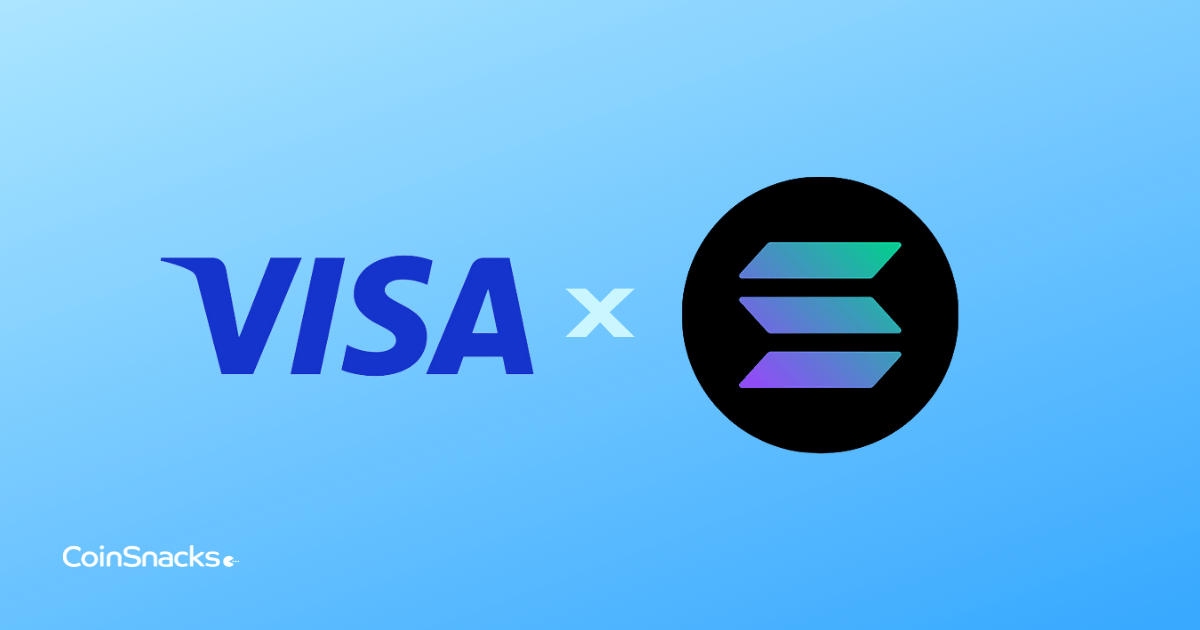- CoinSnacks
- Posts
- Visa Launches Pilot Program with Solana
Visa Launches Pilot Program with Solana
Beyond the adoption narrative, its news like this that suits incredibly well for merchants. Here's why.

I can already see it. SBF, pinned up in a corner of a prison cell, shackled up next to his laptop, quietly fist pumping into the stagnant air after he learns that Solana (SOL) – his seemingly favorite altcoin – is finally creating some buzz without much of his help.
What happened?
Yesterday, Visa said that it would begin to send USDC, the second-largest stablecoin by market cap, to select merchants via the Solana blockchain in a newly announced pilot.
The Backdrop
Typically, whenever someone taps or swipes their credit card, companies like Visa and Mastercard trigger a complicated dance of settlements in the background.
It works like this: You, the consumer, swipes your credit card to pay for something. After a purchase, your bank quickly wires money to Visa’s treasury. From there, Visa pulls funds from its treasury and sends them to the merchant’s bank. And to make money, of course, they tack on a small yet increasing (see below) fee to the merchant.
These transactions are typically all done in the form of fiat. Until now.
Now, with the help of Circle’s USDC, Visa will begin testing to send USDC out of its treasury to two companies, Worldpay and Nuvei, who will then facilitate the payments back to the merchants.
Topping it off, these settlements will all happen on Solana’s (SOL) blockchain instead of Ethereum’s (ETH) because its cheaper, quicker, and more efficient overall.
Why It Matters
The pilot program undoubtedly signals a positive direction for blockchain/stablecoin adoption. Crypto thought-leader Nic Carter even said that this was one of the most important news events of 2023.
@cuysheffield this is one of the most important news items of the year.
— nic 🌠 carter (@nic__carter)
2:32 PM • Sep 5, 2023
Beyond the adoption narrative, its news like this that suits incredibly well for merchants.
Whether selling a cup of joe around the corner or products online, every merchant in this country is getting hit with higher and higher transaction fees. The WSJ highlighted, just last week, how Visa and Mastercard are planning to raise credit card fees yet again, in which merchants are estimated to pay an additional $502 million annually in fees.

The fees are getting so ridiculous, that many small businesses across the US are beginning to offer discounts to shoppers who choose to pay via debit card, cash, or check.
Using crypto to facilitate payments, in theory, should be much cheaper than it is with fiat. We’d love if these crypto transactions wouldn’t have to go through a middleman – but we’ll take what we can get. More affordable merchant transactions can be a huge catalyst for crypto adoption going forward.
Now, while we’re still years away from consumers commonly using USDC, or PayPal’s PYUSD, or heck – even Bitcoin (BTC) – to pay for common goods and services, it’s still neat to see traditional financial conglomerates like Visa better prepare themselves for the future of payments, commerce, and financial applications using fiat alternatives. Truly, very cool stuff.
Time to Buy Solana (SOL)?
In light of this news, we’ve seen a lot of publications ask the question of what this new Visa partnership could mean for SOL.
Our answer? Don’t even go there.
It's easy to get carried away with the headlines, but there are a few caveats to consider.
First, Solana's SOL token saw a mere 4% uptick following the announcement, which doesn't seem like much when the token is still languishing 90% below its peak value from November 2021.
Second, Solana users just recently fell to their lowest level in more than two years.
Third, this is just a pilot program. In other words, they’re beta testing. To add, Visa is offering little to no transparency on how payments are actually being settled. So, even if you're swiping that card, you might not be privy to whether your transactions are going through the traditional payment rails or utilizing Solana's blockchain.
In summary, this isn't a game-changing moment for the industry by any means; it's more like a trial run. In no way whatsoever has this encouraged us to take a “closer look” at Solana.